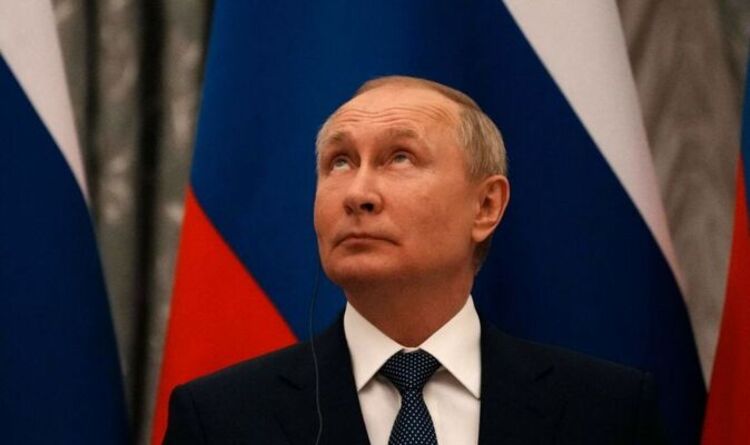Putin ‘preparing to invade any country’ says Kira Rudik
We use your sign-up to provide content in ways you’ve consented to and to improve our understanding of you. This may include adverts from us and 3rd parties based on our understanding. You can unsubscribe at any time. More info
While no one can claim to know exactly what Vladimir Putin will do next, experts have been closely following Moscow to try and second guess what actions he will take. Emily Holland, Assistant Professor at the US Naval War College explains to Express.co.uk the three key reasons behind Moscow’s aggressive actions towards Ukraine.
Dr Holland explains to Express.co.uk that in order to figure out what President Putin wants we should first listen to “what Moscow is saying, both in its press releases and through its strategies and demands.”
She said: “The West is often surprised by Russian actions when they should not be because Russia often tells us what they are going to do ahead of time.”
Dr Holland has analysed the dialogue from Moscow and has come up with these three reasons as central to Russia’s justification for a future invasion of Ukraine.
The expansion of NATO
Although Ukraine could park its ambitions of joining NATO in a bid to avoid war President Putin is still looking for guarantees that NATO won’t expand further.


Ukraine’s ambassador to the UK, Vadym Prystaiko, told the BBC Ukraine was willing to be “flexible” over its plans to join NATO if such a move would trigger war.
However, Dr Holland said Russia wants concrete reassurances that NATO won’t allow Ukraine or for anyone else to join.
She said: “Russia believes that NATO expansion to Ukraine and NATO activities in Ukraine are a threat to basic Russian security.
“Further, they believe that any further NATO activity (or expansion) in the former Soviet space is an existential threat to Russian security, and they want a formal guarantee that this will not happen.

“Moscow views Kyiv’s increasing security cooperation with the United States and NATO as signs that Ukraine will eventually join the alliance.”
Russian resentment towards European security restrictions
Dr Holland believes that Russia’s recent aggression towards Ukraine has roots dating back to the 1990s.
She explained: “Moscow has been unhappy with European security arrangements since the 1990s: these issues include arms control, NATO cooperation with non-member states in the region, NATOs borders, and Russia’s role in Europe.

“Russia was forced to accept the current European security architecture during the 1990s when it was weak and insolvent.
“Now that Russia has made vast improvements to its military capabilities and technology, and has insulated itself economically, Moscow is clearly ready to show that it is serious about pursuing its long-standing demands in this arena.”
The continued conflict in Ukraine’s eastern regions
In 2014 Russia annexed the Crimean Peninsula from Ukraine, since then the region has been occupied by Russia.
It seems President Putin has grown increasingly concerned that Ukrainian President Volodymyr Zelensky might seek to take back Crimea.
She said: “Over the past several months, it has become clear that Russia is no longer willing to tolerate the status quo.
“Ukrainian President Zelensky campaigned on ending the war with Russian backed separatist regions, but once in office adopted a hardline position, and sought to revise the Minsk II agreement as well as demand promises from the West about future NATO membership.”
Dr Holland is keen to stress that while the points listed above are the reasons Moscow has given us for why its recent actions have been necessary, she added a caveat: “I don’t mean to say that they are reasons that Russia will invade.”
President Putin may big up the “Russian security risk” as a motive behind any Ukrainian invasion.
However, factors such as a desire to expand Russia’s territory and a belief that Ukrainians and Russians should be united under Moscow’s rule as they are “one people” might also be motivating factors for Putin.
Source: Read Full Article
